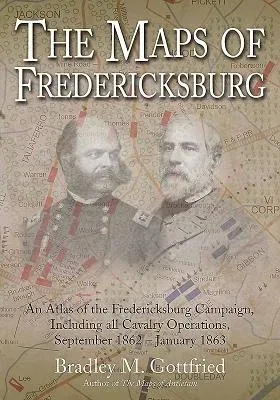**Finalist, 2018, Reference, Army Historical Foundation Distinguished
Book Award
**
The Maps of Fredericksburg: An Atlas of the Fredericksburg Campaign,
Including all Cavalry Operations, September 18, 1862 - January 22, 1863
continues Bradley M. Gottfried's efforts to study and illustrate the
major campaigns of the Civil War's Eastern Theater. This is his sixth
book in the ongoing Savas Beatie Military Atlas Series.
After Robert E. Lee's Army of Northern Virginia was forced out of
Maryland in September 1862, President Abraham Lincoln grew frustrated by
Maj. Gen. George McClellan's failure to vigorously purse the Rebels and
replaced him with Ambrose Burnside. The opening stages of what would
come to be the Fredericksburg Campaign began in early October when the
armies moved south. After several skirmishes, it became clear Burnside
would force a crossing at Fredericksburg and drive south. Delays in
doing so provided General Lee with time to get his troops into position
behind the city.
The initial fighting occurred on December 11 when a single Mississippi
Confederate brigade gallantly delayed the Union bridge-building efforts.
Once across, Burnside's army prepared for action. The main battle took
place on December 13, a two-pronged attack against Marye's Heights on
the Union right and Prospect Hill at the opposite end of the line.
Neither was successful. Burnside contemplated another attempt to flank
Lee, but the January weather conspired against him and he was removed
from command.
Unlike other treatments of this epic fight, The Maps of Fredericksburg
plows new ground by breaking down the entire campaign into twenty-two
map sets or "action sections," enriched with 122 detailed full-page
color maps. These cartographic originals bore down to the regimental and
battery level, and include the march to and from the battlefield and
virtually every significant event in between. At least two--and as many
as ten--maps accompany each map set. Keyed to each piece of cartography
is a full facing page of detailed text describing the units,
personalities, movements, and combat (including quotes from
eyewitnesses) depicted on the accompanying map, all of which make the
Fredericksburg story come alive.
This presentation allows readers to easily and quickly fine a map and
text on virtually any portion of the campaign, from the march south to
Fredericksburg to the Mud March in early 1863. Serious students of the
battle will appreciate the extensive and authoritative endnotes and
complete order of battle. Everyone will want to take the book along on
trips to the battlefield. A final bonus is that the maps in this work
unlock every other book or article written on this fascinating
campaign.
Perfect for the easy chair or for stomping the hallowed ground of
Fredericksburg, The Maps of Fredericksburg is a seminal work that
belongs on the bookshelf of every serious and casual student of the
battle.

